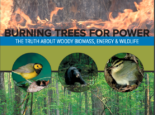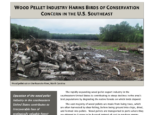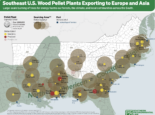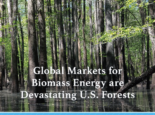The environmental impacts of biomass energy
What is biomass energy?
As the world looked for clean alternatives to fossil fuels, the energy contained in trees emerged as a power source for electric utilities and heating systems. However, biomass energy creates long-lasting impacts on the environment, and, at times, can be as harmful as fossil fuels. The biomass energy industry turns trees into wood pellets, which are then burned as a source of power. Much of the fast-growing demand for wood pellets comes from overseas, where European countries, including the United Kingdom, have heavily subsidized wood pellet burning for power generation. The wood pellet export industry has exploded in the South, a region known for its vast tracts of forestlands.
How biomass energy affects Southern forests & climate
Mature forests, including highly valued wetlands, are being clear cut to feed the increasing demand for wood pellets. For example, the production capacity of the five operating Enviva wood pellet plants in North Carolina and southeast Virginia requires harvesting approximately 60,300 acres or 94 square miles of these highly biodiverse forests each year. Clear cutting trees at this scale destroys important wildlife habitats and ecosystems and can damage our water quality.
Help us push back against the dangerous biomass energy industry.
America’s forests also serve as carbon sinks that absorb 12 percent of the heat-trapping carbon dioxide emissions the U.S. pumps out each year. Burning trees to generate electricity releases this CO2 and, in fact, can produce more carbon emissions per megawatt hour than burning coal. A 2015 Spatial Informatics Group analysis commissioned by the Southern Environmental Law Center found that the net lifecycle emissions of heat trapping carbon dioxide from the burning of wood pellets from the southeast U.S. would be 3.4 times higher than continued use of coal over 100 years. Even when wood pellets are made from thinnings of pine plantations, burning those pellets increased CO2 emissions for over 40 years according to a recent analysis SELC commissioned. Drax, a massive UK power producer that has converted four of its coal-fired units to biomass, has emitted over 98 million metric tons of CO2 from its biomass plant over the last decade.
Large-scale burning of trees for energy harms our forests, the climate, and local communities across the South. SELC is fighting to end Europe’s reliance on biomass energy while ensuring local, state, and federal lawmakers in the United States do not make the same mistakes made overseas.
Heather Hillaker, SELC staff attorney
How biomass energy affects local communities
Along with CO2, manufacturing and burning wood pellets produces harmful pollutants like nitrogen oxides, volatile organic compounds, hazardous air pollutants, and microscopic dust particles that contribute to serious health risks. The communities living closest to pellet manufacturing facilities throughout the southern U.S. are predominantly communities of color that already bear the brunt of environmental harms. These communities are exposed to increased air pollution and dust from these facilities, round-the-clock noise, local tree loss, and increased truck and rail traffic—all things that can negatively impact their health and quality of life.
We helped a North Carolina community fight back against the negative effects of biomass energy.
SELC is pushing for stronger restrictions on biomass energy
Increased regulations on the biomass industry are necessary to mitigate the growing impacts of climate change and protect the South’s natural resources. In order to reduce the environmental and community impacts of biomass energy, we are calling for an end to U.K. and European Union subsidies of the industry, a ban on the use of whole trees to create wood pellets and restrictions that keep national forests off-limits to biomass extractions. Additionally, we believe biomass for power generation must be limited to genuine industrial wood waste, such as clean construction debris, sawdust, and other residue from lumber and wood processing.
A new report shows major U.K. power producer Drax’s strategy and business model are subject to considerable risk and uncertainty, and even a relatively small rise in the cost of wood pellets could affect the company’s viability. The report also notes that Drax’s business is not financially viable without government subsidies, and calls into question the company’s planned reliance on an unproven technology—biomass with carbon capture and storage (BECCS).
Recently, biomass energy has also received growing attention in the United States. We are committed to ensuring American lawmakers don’t make the same mistakes made in other countries and that policy makers are aware of the negative effects biomass energy poses to the climate, local communities, and the South’s air, water, and millions of acres of forest land.





